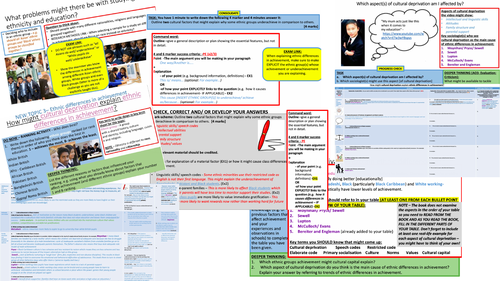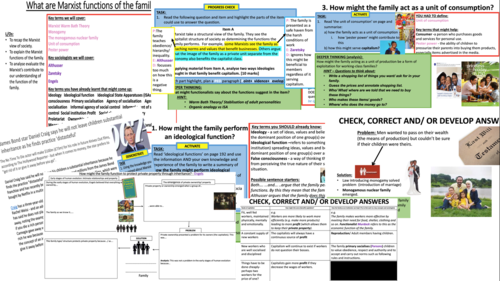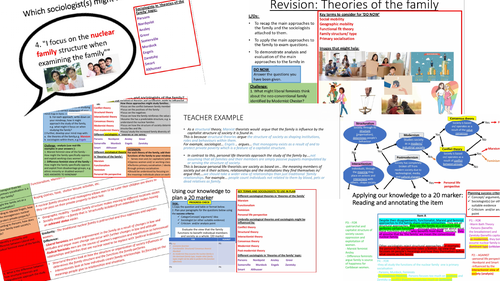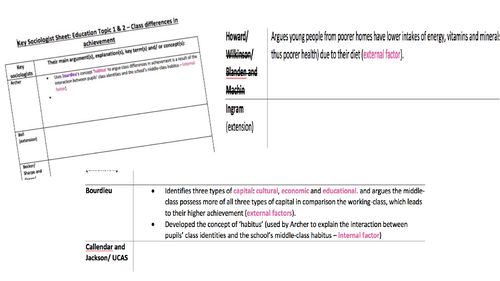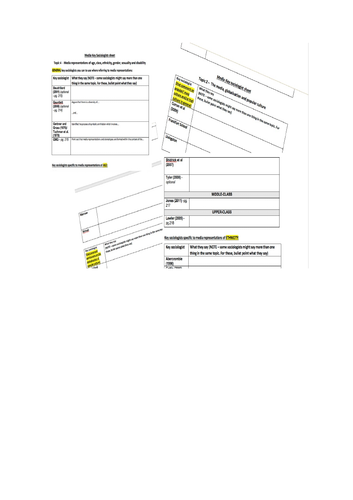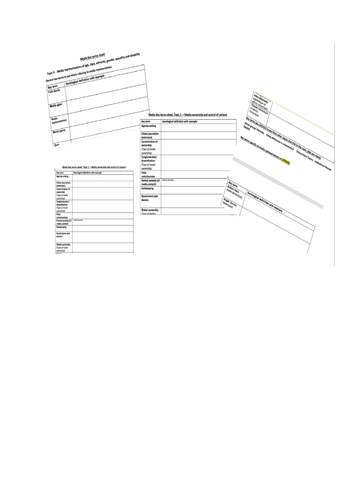
111Uploads
14k+Views
3k+Downloads
Sociology

AQA A-level Sociology: Education Topic 3 Ethnic differences - Cultural deprivation
Detailed and differentiated (up and down) student led lesson that introduces students to ethnic differences in achievement and explores how different aspects of cultural deprivation (language, attitudes and values, and parental structure) might cause ethnic differences in achievement. To do this, the lesson explores the following key terms: ethnic group, ethnic differences in achievement, cultural deprivation, compensatory education and makes reference to other key terms students should have previously learnt (restricted code, working-class subculture, meritocracy, internal vs external factors, cultural vs material factors)
Uses and refers to ’ AQA A Level Sociology Book One Including AS Level: Book one 3rd Revised edition by Rob Webb, Hal Westergaard, Keith Trobe, Annie Townend ’ textbook
RESOURCES CAN BE FOUND AT THE END OF THE PPT.
ANSWERS FOR MAIN ACTIVITY CAN BE FOUND ON NEXT SLIDE AFTER ACTIVITY SLIDE
*STUDENT FRIENDLY MARK-SCHEME FOR 4 MARKER INCLUDED

AQA A-level Sociology Education Topic 5 Role of education - The New Right view
Detailed student led lesson on the New Right critique and view of the purpose state education adapted to stretch and challenge the most able whilst scaffolding to allow pupils who need support the opportunity to access higher level thinking.
Covers the following key terms:
Neo-liberalism
The New Right
Conservatives
Voucher system
One-size-fits-all approach
League tables
Ofsted reports
National curriculum
Marketisation
Privatisation
Academies
Free schools
State schools
Social policies
Covers the following key sociologists: Chubb and Moe
Uses and refers to ’AQA A Level Sociology Book One Including AS Level: Book one 3rd Revised edition by Rob Webb, Hal Westergaard, Keith Trobe, Annie Townend ’ textbook
BRIEF ANSWERS TO THE MAIN ACTIVITY INCLUDED
NOTES -RESOURCES CAN BE FOUND AT THE END OF THE PPT.

AQA A-level Sociology Families: Theories of the family – Marxist functions of the family
Detailed and differentiated (up and down) student-led lesson that examines, analyses and evaluates Marxists Althusser, Zaretsky and Engels’ views and functions of the family.
Lesson explores the concepts: Marxist Warm Bath Theory, Monogamy , The monogamous nuclear family , Unit of consumption, Pester power, ideology, ideological function, false consciousness
Lesson makes links to general Marxist key terms and other family key terms that students might have previously been taught.
Main activities makes reference to AQA A-level Book 1 by Townsend
Includes exam questions and guidance for answering them.
***** MOST ACTIVITIES INCLUDE ANSWERS****
Starter assesses prior learning on Parson’s functions of the family
***** WORKSHEETS AT THE END OF THE PPT****

AQA A-level Sociology: Theories of the Family Revision lesson -How to further develop exam answers?
Detailed and differentiated (up and down), student led lesson that:
recaps the key sociologists students learn in this topic and what they say about the function(S) of the family.
recaps the main umbrella theories that students learn in year 12 (structuralism vs interactionism, modernism vs postmodernism and conflict vs consensus theories), how they view society and how this influences functionalist, marxist, feminist and personal life perspective approaches to the family.
how the knowledge above can be applied to exam questions to demonstrate both analysis and evaluation (AO3), e.g. by highlight the similarities and differences between the different theories of family or using knowledge of the umbrella theories to evaluate theories of the family.
supports students with planning a 20 marker on theories of the family using the item.
**RESOURCES CAN BE FOUND AT THE END OF THE PPT.
***
**ANSWERS FOR MOST OF THE ACTIVITIES CAN BE FOUND ON NEXT SLIDE AFTER ACTIVITY SLIDE
**
INCLUDES ORACY ACTIVITY

AQA A-level Sociology: How to further develop exam answers using the AOs? - Couples Revision
Detailed and differentiated (up and down), student led lesson that teaches exam skills and recaps ‘Couples’ content of AQA specification; recaps the main sociologists and themes in the ‘Family’ unit, Topic 1 – Couples WHILST teaching students how to use the Assessment Objectives (AOs) -AO1, AO2, AO3- to further develop their answers using MODEL ANSWERS and examples.
NOTE – Students will need to have gone over or have a basic understanding of using a set success criteria or writing format for their paragraphs TO BE ABLE TO GAIN THE MOST OF OUT THIS LESSON – this lesson using set success criteria PEELE/A (for 20 markers) and PERD (for 10 markers).
**RESOURCES CAN BE FOUND AT THE END OF THE PPT.
**
**ANSWERS FOR MOST OF THE ACTIVITIES CAN BE FOUND ON NEXT SLIDE AFTER ACTIVITY SLIDE
**
Bundle

SOCIOLOGY Research Methods - INTRO, PET ISSUES, SAMPLING METHODS
Detailed and differentiated set of student-led lessons made for AQA A/AS-LEVEL SOCIOLOGY but can be differentiated for GCSE (see below-L2) and any SPEC (as it goes through the main methods, terms, issues for social research in general:
Intro to Methods
Explores primary vs secondary methods, quantitative vs qualitative methods, validity and reliability as a way to introduce students to the main main research methods.
Explores practical (time, cost, research opportunity, requirements of funding body & subject matter), ethical (informed consent, confidentiality, harm to participants, vulnerable groups & covert research) and theoretical issues (validity, reliability, representativeness, methodological perspectives, interpretivism & positivism).
*** Catered towards A-LEVEL AQA sociology but if main activity can be replaced, the rest can be used for GCSE and ANY SPEC.**
*** Main activity uses pages 92-94 of the AQA A Level Sociology Book One Including AS Level: Book one 3rd Revised edition by Rob Webb, Hal Westergaard, Keith Trobe, Annie Townend**
explores sampling methods, sampling frame, representative (sample), generalising (findings) and the relationship between these and positivism vss interpretivism and theoretical issues
LESSON COMES WITH ANSWERS

AQA A-level Sociology Education Topic 5 Role of education - Marxist view
Detailed student led lesson on the Marxist views of the role of education adapted to stretch and challenge the most able whilst scaffolding to allow pupils who need support the opportunity to access higher level thinking.
Covers the following Marxist key functions of education: reproducing class ienquality, legitimising class inequality, correspondence principle,
Covers the following functionalist sociologists: Althusser, Bowles and Gintis and Willis
Covers the following key term:
State apparatuses
Ideological state apparatuses
Repressive state apparatuses
Ideology
Correspondence principle
Hierarchy
Alienation
Fragmentation
Extrinsic reward
Competition
Promotes a spiral curriculum by making links to key terms that students might have previously been taught within the education unit and for Marxism as a theory that link to this lesson.
Makes links to methods in context 20 marker - provides scaffolding and possible questions that link to Willis’ study.
Promotes, facilitates and scaffolds Oracy.
Provides guidance for answering 4 markers.
Uses and refers to ’ AQA A Level Sociology Book One Including AS Level: Book one 3rd Revised edition by Rob Webb, Hal Westergaard, Keith Trobe, Annie Townend ’ textbook
DETAILED ANSWERS INCLUDED FOR THE MAIN ACTIVITIES ON THE FUNCTIONS OF EDUCATION ONLY
NOTES -RESOURCES CAN BE FOUND AT THE END OF THE PPT.

AQA A-level Sociology Education Topic 1- 2 key sociologists sheets
Detailed and scaffolded (e.g. SOME sentence starters/ prompts, model examples of what sociologists say (and what students are expected to write and how), etc.) key sociologists sheets that requires students to write done what key sociologists from education:
Topic 1 - Class differences in achievement (external factors)
Topic 2 - Class differences in achievement (internal factors)
Sociologists in alphabetical order
Good form of revision and revision resource for the students.
**BASED ON CONTENT in textbook - AQA A Level Sociology Book One Including AS Level: Book one 3rd Revised edition by Rob Webb, Hal Westergaard, Keith Trobe, Annie Townend ’ textbook

AQA A-level Sociology Education Topic 5 Role of education - Functionalist view
Detailed student led lesson on functionalist views of the role of education adapted to stretch and challenge the most able whilst scaffolding to allow pupils who need support the opportunity to access higher level thinking.
Covers the following functionalist key functions of education: installing social solidarity, bridging the gap between the family and wider society through secondary socialisation, teaching specialist skills needed for work and role allocation.
Covers the following functionalist sociologists: Durkheim, Parsons and Davis and Moore.
Covers the following key term:
Function or role (e.g. of an institution)
Social solidarity
Formal curriculum
Hidden curriculum
Ascribed status
Achieved status
Universalistic standards
Particularistic standards
Meritocracy
Socialisation
Role allocation
Promotes a spiral curriculum by making links to key terms that students might have previously been taught that link to this lesson.
Promotes, facilitates and scaffolds Oracy.
Develops the skills needed to answer 10 markers with items - allows students to apply knowledge to an item 10 marker with guidance and includes a detailed success criteria to help them answer this.
Uses and refers to ’ AQA A Level Sociology Book One Including AS Level: Book one 3rd Revised edition by Rob Webb, Hal Westergaard, Keith Trobe, Annie Townend ’ textbook
DETAILED ANSWERS INCLUDED FOR MAIN ACTIVITIES
NOTES -RESOURCES CAN BE FOUND AT THE END OF THE PPT.

AQA A-level Sociology -Developing AO3 skills - Explicit criticisms and explained analysis
Detailed student led lesson on what is meant by explicit (vs juxtaposed) criticisms and explained analysis and how to demonstrate these high level AO3 skills needed for A*-A answers for AQA exams. The lesson is adapted to stretch and challenge the most able whilst scaffolding to allow pupils who need support the opportunity to access higher level thinking.
INCLUDES:
SIX MODEL PARAGRAPHS- from theory and methods (postmodernism and Marxism), methods in context, crime (punishment), media and family. THOSE WHO DO NOT TEACH FAMILY OR MEDIA will have 4 model paragraphs in total)
ANSWERS FOR ACTIVITIES
AfL
A 7 page information sheet on explicit criticisms and explained analysis from the skills booklets (can be bought separately - includes other guidance and skills for preparing for exams) that explain the two different skills, success criteria with sentence starters of how to demonstrate each and provides brief examples (of explicit criticisms, juxtaposed criticisms, explained analysis, analysis that is limited to an isolated statement). Also includes analysis guidance and sentence starters for research methods paragraphs and guidance of how students might go even further by explaining their criticisms.
**NOTE **- Activity on slide 8 is challenging. If students struggle too much with it, show answers on slide 9 and move onto the progress check activity that will make clearer how explicit criticisms are written.
**NOTE ** -The focus of evaluations are criticisms for this lesson
RESOURCES CAN BE FOUND AT THE END OF THE PPT (AND INFO SHEET FROM SKILLS BOOKLET IS ATTACHED AS A WORD DOC)
Bundle

KEY TERMS SHEET - AQA A-level Sociology Education: Topics 1-5
Alphabetical key term sheet for AQA A-level Sociology Education Topics 1-5. Contains the main key terms used in Topic 1-6 of the education unit for AQA A-level Sociology:
-Topic 1 - Class differences in achievement (external factors)
-Topic 2 - Class differences in achievement (internal factors)
-Topic 3 - Ethnic differences in achievement
-Topic 4 - Gender differences in achievement
-Topic 5 - Role of education
-Topic 6 - Education policy
*** Includes scaffolding, e.g. some sentence starters (to model to students how to incorporate key sociologists into their definitions) and prompts to help students remember how key term links to the topic. **
*** Includes a section with key terms that students should know from previous learning (for topic 3 sheet ethnic differences - this would be terms that link to key terms covered in class differences in achievement, e.g. labelling, pupil identities, material deprivation, speech codes etc) that link to this topic. **
Good form of revision for students and can be used as a revision resource to develop AO1 once filled out.
**BASED ON CONTENT textbook - AQA A Level Sociology Book One Including AS Level: Book one 3rd Revised edition by Rob Webb, Hal Westergaard, Keith Trobe, Annie Townend ’ textbook
Bundle

A-LEVEL SOCIOLOGY INTRO LESSONS - nature vs nurture, functionalism, marxism, feminism, QUIZ & ANSWERS
Detailed and differentiated (up and down) student-led lessons that help students to develop their knowledge and understanding from previous lesson(s). L2 uses page 8 from AQA Book 1 by townsend but CAN BE USED FOR ANY SPEC using resources within lesson (see below). Comes with key term sheet for the lesson.
1. Introduction to Sociology - provides an overview of Sociology course (spec to AQA A-level but can easily be edited to suit ANY SPEC and GCSE) and the sociological imagination.
2. How do sociologists explain behaviour? -Nature vs Nurture lesson -explores the nature vs debate, norms, values, socialisation (primary/secondary) and social control as an introduction to Sociology. Uses page 8 of the AQA A-level Book 1 by Townsend to introduces students to the nature vs nurture debate but this can be replaced and the rest of the lesson can still be used.
3. Introduction to functionalism -explores value consensus, social order, biological/ organic analogy, structuralism, consensus theories to introduce students to the key functionalist views and ideas.
4. Introduction to Marxism -explores capitalism, ownership, interests, structuralism, conflict theories, exploitation as a way to introduce students to the main Marxist views and ideas.
5. Introduction to feminism - explores sex, gender, gender roles, patriarchy, socialisation, gender inequality as a way to introduce students to the main feminist views of society and ideas.
6. Quiz lesson - small revision activity
25 min quiz (on nature vs nurture, key functionalist, Marxist, feminist’s ideas and terminology) —LESSONS CAN BE FOUND ON MAIN PAGE. Includes:
answers/ mark-scheme
scaffolding for students to peer assess (but quiz can also be marked by teacher)
Made for AQA but can be used for ANY SPEC
Can be differentiated down for GCSE, but I recommend purchasing the GCSE Intro lessons bundle which have alread been edited to meet the needs of KS4 students.

KEY SOCIOLOGISTS SHEETS AQA A-level Sociology Media: Topics 1-4
Detailed and scaffolded (e.g. SOME sentence starters/ prompts, separating sociologists who comment on different aspects of each topic, SOME page numbers for sociologists that might be more difficult to find, etc.) key sociologists sheets that requires students to write done what key sociologists from topics 1-4 say.
Contains the main key sociologists in Topics 1-4 of the media unit for AQA A-level Sociology:
Topic 1 - Ownership and control of the media output
Topic 2 - The media, globalisation and popular culture
Topic 3 -the processes of selection and presentation of the content of the news
Topic 4 -media representations of age, social class, ethnicity, gender, sexuality and disability.
**REQUIRES textbook - 'SOCIOLOGY For AQA Volume 2 by Browne, Blundell & Law **

KEY TERM SHEETS AQA A-level Sociology Media: Topic 1-4
Detailed and scaffolded key term sheet that requires students to fill out the definitions themselves. (e.g. SOME sentence starters/ prompts, separating key terms in term of social groups for topic 4, identifiy the key terms that relate to media stereotypes for topic 4, etc.)
Contains the main key terms used in Topic 1-4 of the media unit for AQA A-level Sociology:
Topic 1 - Ownership and control of the media output
Topic 2 - The media, globalisation and popular culture
Topic 3 -the processes of selection and presentation of the content of the news
Topic 4 -media representations of age, social class, ethnicity, gender, sexuality and disability.
The bottom of the sheet has a section dedicated to the key terms learnt in previous units and topics that might link to this topic. Good form of revision for the students and allows for a spiral curriculum.
**REQUIRES textbook - 'SOCIOLOGY For AQA Volume 2 by Browne, Blundell & Law **
Bundle

WRITING FRAMES (for improving essay writing) - AQA A-level Sociology: Families – Topics 2-6 20 marker
Detailed writing frame that scaffolds (from introduction to conclusion) a full answer for a 20 marker on:
Topic 2 - Childhood - evaluate explanations of childhod
Topic 3 - Theories of the family - whether the family is beneficial
Topic 4 - Demography - position of the old
Topic 5 - Changing family patterns -divorce
Topic 6 - Family diversity - whether individual choice in personal relationships has made family life less important
*** Based on AQA specification**
*** Supports students with planning the 20 marker (using the item) - using planning success criteria.
**
*** Outlines the success criteria and provides sentence starters for the full essay (intro, main body and conclusion). Success criteria used for paragraphs in main body of essay is PEELE/A**
*** Outlines the key terms, sociologists, theories that can be used when answering the question.**
*** Supports students who need support and guidance with writing essays whilst providing students who are already good at writing essays opportunities to further improve their essay skills. **
Bundle

AQA A-LEVEL Sociology Family Topic 2 Childhood - LESSONS, KEY TERM SHEET AND REVISION LESSON
LESSONS
L1 - Detailed and differentiated student-led lesson that explores childhood, social constructionism, industrialisation (briefly), the globalisation of western childhood , western notion of childhood as a way to introduce students to the idea of the social construction of childhood. Mostly focusses on cross-cultural differences in childhood but briefly covers historical differences of childhood in Britain. Explores the views of sociologists such as Pilcher, Benedict, Wagg, Punch, Holmes, Firth and Malinowski. AQA A-level Families Topic 2 Childhood- Lesson 1
L2 - Detailed and differentiated student-led lesson that explores Pre-industrial society, Industrialisation, Modern western notion of childhood, ‘cult of childhood’, Child-centredness/centred society , Infant mortality, as a way to examine Aries views and explanations of the historical differences in western childhood.
L3 - Detailed and differentiated student-led lesson that explores Information hierarchy , Postmodernity/ postmodern society/ contemporary society, Modernity/ modern society/ industrial society, Accordion family, Boomerang children as a way to examine the changes to the modern western notion of childhood in contemporary society. Covers the views of Postman and Jenks.
L4 - Detailed and differentiated student-led lesson that explores march of progress theory, Toxic childhood, Conflict theory, Age patriarchy, Child liberationism as a way to examine the different views (march of progress and conflict views) of whether childhood has improved over time. Includes views of Gittins, Palmer, Firestone and Holt, Aries etc.
KEY TERM SHEET
Alphabetical key term sheet for AQA A-level Sociology Family Topic 2 Childhood that requires students to fill out the definitions themselves. Includes some sentence starters for more difficult key terms.
**Good form of revision for students and can be used as a revision resource to develop AO1 once filled out. **
**BASED ON CONTENT in textbook - AQA A Level Sociology Book One Including AS Level: Book one 3rd Revised edition by Rob Webb, Hal Westergaard, Keith Trobe, Annie Townend ’ textbook
**REVISION LESSON **-
Detailed and differentiated (up and down) student led lesson that supports students in recapping the main theories, views and explanations of the position of childhood; examines how march of progress, conflict, child liberationists and postmodernist theories’ view society and how this might influence their approach or view of childhood and its changes over time. Also highlights the key sociologists (Katz, Postman, Aries, Palmer, Jenks, Gittens) in this topic.
The lesson then requires students to apply this knowledge to plan (using a success criteria) a 20 marker and write at least one paragraph for it.
Bundle

GCSE AQA Sociology INTRO LESSONS & QUIZ
Detailed and differentiated (up and down) student-led lessons that help students to develop their knowledge and understanding from previous lesson(s). Includes 6 lessons (the last being a quiz lesson) and a key term sheet that covers the key terms in these lessons:
**L1 – Intro to GCSE AQA Sociology: **
an overview of the course, exam and curriculum
An activity on how to create and maintain a safe space for discussions
suggested revision websites and youtube channels that students can use to develop their knowledge and understanding of key ideas and concepts.
activities to introduce students to Sociology and sociological thinking/ inquiry.
Expectations
L2 – How might sociologists explain behavior?
Explores, norms, values, socialisation (primary/secondary) and social control, agencies and agents of socialisation and social control as an introduction to Sociology.
Also looks at the importance of primary socialisation and the consequences of it inadequately performed.
3 marker with a success criteria and student friendly mark-scheme
L3 – Intro to functionalism
Explores value consensus, social order, biological/ organic analogy, structuralism, consensus theories and social cohesion as way of introducing students to the key main functionalist views and ideas.
3 marker with a success criteria and student friendly mark-scheme
L4 – Intro to Marxism
explores capitalism, profit, social class, ownership, interests, structuralism, conflict theories, exploitation, false consciousness and social relations of production as a way to introduce students to the main Marxist views and ideas.
**L5 – Intro to feminism **
explores sex, gender, gender roles, patriarchy, gender inequality as a way to introduce students to the main feminist views of society and ideas.
3 marker with a success criteria and student friendly mark-scheme
**L6 – Quiz lesson **
small revision activity –that looks at the similarities and differences between functionalism, Marxism and feminism
25 min quiz (on basic sociological concepts, key functionalist, Marxist, feminist’s ideas and terminology)
answers/ mark-scheme for quiz
scaffolding for students to peer assess (but quiz can also be marked by teacher)
SAME as A-level intro quiz but excludes questions on the nature – nurture debate.
Made to meet the needs of the AQA SPEC but can be edited to meet the needs of any spec, e.g. key terms in L2-5 meet the AQA spec
Answers included for main activities and quiz
**L2,3 & 5 include 3 marker, success criteria to answer this and student-friendly mark-scheme for self and/ or peer-assessment. **
Bundle

GCSE Sociology - INTRO LESSONS, QUIZ & KEY TERM SHEET
Detailed and differentiated (up and down) student-led lessons that help students to develop their knowledge and understanding from previous lesson(s). Includes 6 lessons (the last being a quiz lesson) and a key term sheet that covers the key terms in these lessons:
**L1 – Intro to GCSE AQA Sociology: **
an overview of the course, exam and curriculum
An activity on how to create and maintain a safe space for discussions
suggested revision websites and youtube channels that students can use to develop their knowledge and understanding of key ideas and concepts.
activities to introduce students to Sociology and sociological thinking/ inquiry.
Expectations
L2 – How might sociologists explain behavior?
Explores, norms, values, socialisation (primary/secondary) and social control, agencies and agents of socialisation and social control as an introduction to Sociology.
Also looks at the importance of primary socialisation and the consequences of it inadequately performed.
3 marker with a success criteria and student friendly mark-scheme
L3 – Intro to functionalism
Explores value consensus, social order, biological/ organic analogy, structuralism, consensus theories and social cohesion as way of introducing students to the key main functionalist views and ideas.
3 marker with a success criteria and student friendly mark-scheme
L4 – Intro to Marxism
explores capitalism, profit, social class, ownership, interests, structuralism, conflict theories, exploitation, false consciousness and social relations of production as a way to introduce students to the main Marxist views and ideas.
**L5 – Intro to feminism **
explores sex, gender, gender roles, patriarchy, gender inequality as a way to introduce students to the main feminist views of society and ideas.
3 marker with a success criteria and student friendly mark-scheme
**L6 – Quiz lesson **
small revision activity –that looks at the similarities and differences between functionalism, Marxism and feminism
25 min quiz (on basic sociological concepts, key functionalist, Marxist, feminist’s ideas and terminology)
answers/ mark-scheme for quiz
scaffolding for students to peer assess (but quiz can also be marked by teacher)
SAME as A-level intro quiz but excludes questions on the nature – nurture debate.
Can be edited to meet the needs of any spec – key terms in L2-5 meet the AQA spec
Answers included for main activities and quiz
L2,3 & 5 include 3 marker, success criteria to answer this and student-friendly mark-scheme for self and/ or peer-assessment.
Bundle

AQA A-level Sociology Families: Topic 1 Couples - LESSONS, KEY TERM SHEET & REVISION LESSON
Bundle for AQA A-level Sociology Couples topic in the Families unit. Bundles includes 5 lessons, a key term sheet (for students to fill out) for the topic and a revision lesson (see below for more information on each):
**LESSONS **
Most answers to main activities included. Refers to key terms from previous lessons and units students might know that link and uses and refers to ’ AQA A Level Sociology Book One Including AS Level: Book one 3rd Revised edition by Rob Webb, Hal Westergaard, Keith Trobe, Annie Townend ’ textbook. ALL RESOURCES CAN BE FOUND AT THE END ON THE PPT
L1 - Detailed and differentiated (up and down) student-led lesson that examines and analyses the following key terms to introduce students to the main family structures: Family, Household,Family structure/ type, Nuclear family, Lone-parent family, Same-sex family, Reconstituted family (or blended family) , Beanpole family, Extend family (horizontally and vertically) , Empty-nest family, Cohabitating couples, Contemporary society, Traditional, Family diversity, Living Apart Together/ LATs (extension)
L2 - Detailed and differentiated (up and down) student-led lesson that examines and analyses the following key terms to introduce students to the traditional functionalist (Parsons) view of the domestic division of labour:
Domestic labour , Domestic division of labour, Conjugal roles
Conjugal (extension), Conjugal relationships (extension), Joint conjugal roles, Segregated conjugal roles, Instrumental role, Expressive role, Conjugal relationships (extension), Pre-industrial society (extension), Industrial Revolution (extension),
Consumption (extension)
L3 - Detailed and differentiated (up and down) student-led lesson that examines and analyses the following key terms to examine march of progress and feminist views of how women’s involvement paid work has had an impact on the domestic division of labour:
Dual‐earner couples, The New man, The ‘march of progress’ view
Double shift / dual burden, Triple shift, Emotion work, Cultural/ Ideological explanation (of segregated conjugal roles), Material/ Economic explanation (of segregated conjugal roles)
Ideology, Geographic mobility (extension), Commercialisation (extension)
Examines the ideas of :Young and Wilmott, Oakley, Hochschild , Gershuny/ Sullivan, Ferri and Smith, Crompton and Lyonette
L4 - Detailed and differentiated (up and down) student-led lesson that examines and analyses the following key terms to examine how money might be managed and how decision-making might be organised in families : Power, The allowance system, Pooling, Cultural/ Ideological explanation (of decision making), Material/ Economic explanation of inequality (of decision making),Personal life perspective (of money)
Examines the views of the following sociologists:
PAHL AND VOGLER (1993), Barret and McIntosh, Kempson, EDGELL, Laurie and Gershuny, CROMPTON AND LYONETTE, Pahl
L5 - L5 AQA A-level Families- Couples: Domestic violence
Detailed and differentiated (up and down) student-led lesson that examines and analyses the following key terms to examine patterns and explanations of domestic violence: Domestic violence/ abuse, Radical feminists, Materialism,
Marxist feminism, Radical feminist explanation (of domestic violence)
Marxist feminist explanation (of domestic violence),Materialist explanation (of domestic violence)
Examines the views of the following sociologists: Dobash and Dobash, Millet and Firestone, Wilkinson and Pickett, Ansley
**KEY TERM SHEET **
Key term sheet for AQA A-level Sociology Family Topic 1 Couples that requires students to fill out the definitions themselves. Includes some sentence starters for more difficult topics.
Good form of revision for students and can be used as a revision resource to develop AO1 once filled out.
**BASED ON CONTENT in textbook - AQA A Level Sociology Book One Including AS Level: Book one 3rd Revised edition by Rob Webb, Hal Westergaard, Keith Trobe, Annie Townend ’ textbook
**REVISION LESSON - **
Detailed and differentiated (up and down), student led lesson that teaches exam skills and recaps ‘Couples’ content of AQA specification; recaps the main sociologists and themes in the ‘Family’ unit, Topic 1 – Couples WHILST teaching students how to use the Assessment Objectives (AOs) -AO1, AO2, AO3- to further develop their answers using MODEL ANSWERS and examples.
NOTE – Students will need to have gone over or have a basic understanding of using a set success criteria or writing format for their paragraphs TO BE ABLE TO GAIN THE MOST OF OUT THIS LESSON – this lesson using set success criteria PEELE/A (for 20 markers) and PERD (for 10 markers).
**RESOURCES CAN BE FOUND AT THE END OF THE PPT.
**
**ANSWERS FOR MOST OF THE ACTIVITIES CAN BE FOUND ON NEXT SLIDE AFTER ACTIVITY SLIDE
**

AQA A-Level Sociology PLCs (ALL UNITS) - EDITABLE
NOW EDITABLE - on a word document
Personal Learning Checklists for the following AQA A-level Sociology syllabus:
Education
Family
Religion
Media
Crime
Theory and Methods (includes separate PLCs for each sub-topic and a combined PLC.
Methods in context

